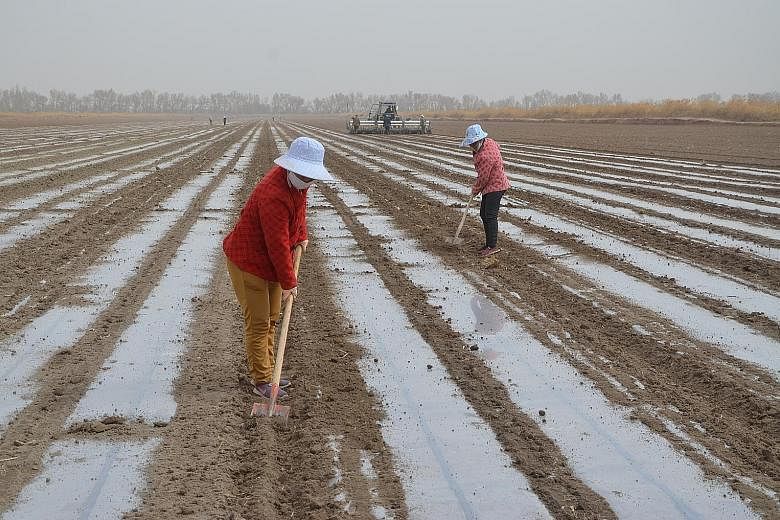BEIJING • Chinese consumers are giving support to Xinjiang-grown cotton and related products to refute "forced labour" accusations.
Claims made by some Western brands including H&M and Nike that they refuse to use Xinjiang cotton due to the alleged use of forced labour in the region have triggered a strong backlash from the Chinese public in the past week.
"Xinjiang cotton is of great quality and I often buy clothes and quilts made of it. It's a loss for these brands to reject the material for political reasons," said Nanjing resident Wang Linlin.
"I think Chinese consumers are clear-headed. They refuse to be fooled by some Westerners who chose to turn a blind eye."
China is the world's second-largest cotton producer, and the Xinjiang Uighur Autonomous Region accounts for about 80 per cent of its output.
Nearly 70 per cent of Xinjiang's cotton fields use machinery to harvest cotton, making large-scale manual cotton-picking a thing of the past, according to official data.
On China's Weibo microblog platform, the hashtag "I support Xinjiang cotton" had received more than 7.4 billion views by Wednesday afternoon. "We support Xinjiang cotton because the national interests are above everything," one Weibo user said.
More customers are sharing their experiences buying Xinjiang cotton products online, frequently using words like "warm", "comfortable" and "durable" to describe clothes, quilts, towels and other items made from the cotton.
During a live-streaming session last week by a popular presenter known as Viya, more than 20 million yuan (S$4 million) worth of Xinjiang cotton products were sold in just an hour.
After being silent for about a week, Swedish retailer H&M released a statement on Wednesday, saying that its commitment to China remains strong and it is dedicated to regaining the trust and confidence of customers, colleagues and business partners in the country.
However, the company remained ambiguous about whether it would use Xinjiang cotton, only stating that it wants to be "a responsible buyer" in China and elsewhere and will comply with local laws and regulatory frameworks in all the markets where it operates.
Besides cotton, Chinese buyers also voiced support for other Xinjiang products.
Topics like "What is worth buying in Xinjiang?" have sparked animated discussions on Weibo.
"Xinjiang fried rice-flour noodles are my favourite. It's super delicious," one netizen wrote.
Xinjiang tomatoes, yogurt and fruits have also been mentioned as personal favourites.
Weibo users have also been sharing facts about Xinjiang cotton.
Many people were surprised to learn that the paper used to make China's bank notes is 95 per cent cotton.
"Don't want Xinjiang cotton? Stop earning money here," one Chinese social media user said.
Xinjiang government spokesman Xu Guixiang said foreign enterprises should not politicise economic behaviour.
The China Consumers Association said the boycott of cotton and related products produced in Xinjiang by certain international trade bodies and foreign firms, based on groundless rumours, has hurt the feelings of Chinese consumers and infringed upon the legitimate rights and interests of consumers.
"These companies, operating in China, should strictly abide by Chinese laws and shoulder the responsibilities of protecting the rights and interests of consumers," it said last week.
CHINA DAILY/ASIA NEWS NETWORK, XINHUA

